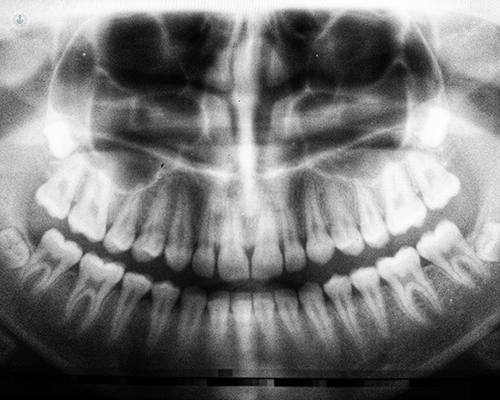Root canal treatment explained
Written by:Beneath the white enamel or your teeth and the dentin layer, there is soft tissue called the pulp. The pulp is made up of blood vessels, nerves and connective tissues, which can become inflamed or infected. This could result from bacteria, tooth decay or traumatic injury. Therefore, a root canal procedure involves the cleaning of the pulp. Symptoms that may precede root canal treatment include pain when eating or chewing, swollen gums, facial swelling, or the tooth may darken in colour. It is important to acknowledge such symptoms and see a dentist as soon as possible. Dr Satinder Matharu, a leading endodontist, gives us the facts about this often feared dental treatment.

What is root canal treatment?
A root canal process involves thoroughly removing the pulp tissue and cleaning within the root canal as thoroughly as possible using fine instruments and disinfectants. This creates a space which eventually is filled with an inert sort of material. After root canal treatment has been finished, the patient is then referred back to the dentist for either a crown or permanent filling.
Read more: Root canal treatment
Who needs root canal treatment?
Root canal treatment is often needed when patients are in pain, or occasionally, it is done for restorative reasons. Usually, patients come in complaining of pain, usually when chewing or biting hot and cold foods. This pain could be acute, or it may be dull. They may come in with swelling or a sinus discharging pus from the region of the tooth. This causes the pulp to be inflamed or infected and quite often this is seen in people who have had a lot of fillings where there has been a lot of tooth decay close to the pulp. If it is infected root canal treatment is usually required.
Other cases that will often require root canal treatment include leaking fillings and crowns or trauma to the teeth. In cases where trauma has damaged the pulp, often there is no apparent damage to the actual tooth, so this can be difficult to identify early on as a patient.
Learn more about endodontic treatment
Is it painful to get a root canal?
Many root canal procedures are carried out to actually relieve pain. Modern anaesthetic solutions and techniques have gone a long way to make this process more comfortable for patients. An inflamed nerve will require more anaesthetic solution. We also have supplementary techniques that we can use to relieve the anxiety and pain of patients. Occasionally, patients are very nervous about having a root canal treatment done and we can offer sedation. Sedation is not a method of pain relief, but it reduces the patient's anxiety and can bring down pain thresholds making treatment a lot more comfortable.
Subsequent to root canal treatment, patients may still suffer a little bit of sensitivity, especially if they have had sensitivity beforehand. We always explain that they may need subsequent pain treatment. This is usually dealt with by over-the-counter medication such as ibuprofen and/or paracetamol. This is always carefully explained to patients and the medication has to be taken on a timed and a regular basis to be effective as it is important to have a certain level of analgesics within the blood system subsequent to treatment. Everybody is slightly different, and some discomfort may be had for a day or two, or for some, it may last up to a week, but if it persists for any reason we will gladly get the patient back to re-examine.
How many visits does root canal treatment take?
Root canal treatment is usually carried out over one or two visits. If the pulp is only inflamed, the ideal treatment time is one visit as most of the pulp's contents can be removed in just one visit. The tooth can be cleaned and shaped adequately, disinfected and then filled again.
However, if the tooth is infected or if there is pus which is draining from the canal, more than one visit may be required. Quite often root canal treatment does require two visits where the tooth is initially cleaned, disinfected and an antiseptic solution is placed within the root canals. This is usually left in place for up to a week and the little hole that is made within the tooth is temporarily sealed until the subsequent visit. If the canal is still dry and it is not leaking, then the root canal treatment can be completed.
There are occasions, especially when there is possibly a large abscess and drainage still coming out, then a third or maybe even a fourth visit might be required. Once treatment has been completed, the tooth is sealed, either with a temporary or a permanent restoration, to ensure that further leakage does not occur. At this stage, the patient is then referred back to the dentist to continue with restorative treatment.
If you are concerned about your dental health or are experiencing the symptoms described here, make an appointment with top endodontist Dr Satinder Matharu at the well-known EndoCare clinic on Harley Street.


